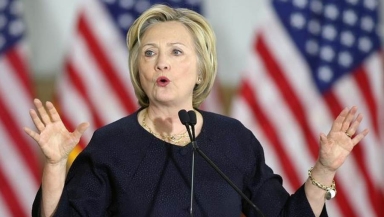Hillary Clinton's policy platform on abortion marks an increasingly liberal departure from that of Barack Obama and, indeed, her own husband's presidency. And it is drawing strong criticism from alienated pro-life Democrats.
The current Clinton campaign promotes its agenda as "the most progressive platform in party history".

The Democrat position on abortion used to be that it should be "rare". Hillary Clinton herself has used this word repeatedly over the years.
Now, "reproductive health" is regarded as "core to women's, men's, and young people's health and well-being".
Indeed, when Hillary's husband Bill Clinton ran for president in 1996, abortion was mentioned once in the Democratic platform. Now it is mentioned 19 times.
"As President, Clinton will continue fighting for women's reproductive freedom," the Hillary Clinton campaign website declares.
"Women's personal health decisions should be made by a woman, her family, and her faith, with the counsel of her doctor. Hillary will fight back against Republican attempts to restrict access to quality, affordable reproductive health care. She will defend access to affordable contraception, preventive care, and safe and legal abortion—not just in principle, but in practice."
Crucially, the platform calls for a wide expansion of abortion access, including the overturning of two key amendments in US law: the Hyde Amendment, which bans federal money from directly funding abortions, and the Helms Amendment, which bans federal dollars from funding abortions abroad.
These changes have led Michael Wear, Obama's Catholic former director of faith outreach, to call the Clinton campaign's position on abortion "morally reprehensible". He told the Catholic News Agency (CNA) that the "extreme" position shuts out millions of pro-life voters.
Dr Matthew Bunson, EWTN Senior Contributor, said: "In [Bill Clinton's 1996 platform], there was specific reference to 'conscience.' You will not find that word in the Democratic platform in 2016."
Dr Charles Camosy, a theology professor at Fordham University, explained to the CNA that the 2016 language portrays "abortion on demand to be a social good worthy of explicit government support with tax dollars from everyone...I don't think anyone who is on the side of justice for the vulnerable, of non-violence, could support something like that," he told CNA.
Camosy this week co-wrote an opinion piece in the Los Angeles Times with Kristen Day, the executive director of the group Democrats for Life of America, saying: "The abortion plank in the 2016 Democratic platform effectively marginalizes the voices of 21 million pro-life Democrats." The article, which was headlined: "How the Democratic platform betrays millions of the party faithful," goes on: "Most significantly, the platform calls for the repeal of the Hyde and Helms amendments, which prevent taxpayer funds from being used to pay for abortions. This would force those who object to abortion to contribute to what we believe would be government-funded killing, and it would eradicate policies that have already saved hundreds of thousands of lives."
Elsewhere, some critics have argued that the Clinton campaign appears to pit religious freedom against the interests of social liberalism. The platform, which is strongly in favour of 'gay marriage' and the extention of gay rights, says: "We support a progressive vision of religious freedom that respects pluralism and rejects the misuse of religion to discriminate."
"Religious freedom has become so polarised" and "so politicised," Wear told CNA. "It's a sincere problem when people think that if Catholic hospitals are no longer able to operate, the free market would fill in the gaps," he said. "That's not true. That's not true in a state like Washington, where they provide over half of the hospital beds."
"And so there needs to be, I think, an authentic, free, but public way of sharing the pivotal role that we play in this country. And it's discordant to talk about helping immigrants, and then not appreciate Catholic Relief Services."
Not all Christian pro-life Democrats are opposed to Hillary Clinton however. Pastor Tony Campolo, a former spiritual advisor to Bill Clinton, wrote on Red Letter Christians that she will do much to reduce abortion because of the economic factors, and not legislative measures, that drive up termination rates.
"Some of my evangelical friends raise questions about her views on abortion," he said. "But Clinton is one of the few candidates on the political stage who has a plan for cutting the abortion rate in America by at least 50 percent. She points out that 72 percent of the women who have abortions do so for economic reasons, not because they want to terminate the life of the unborn. When single, economically strapped women, who are working a minimum wage job become pregnant, they have to ask themselves if they have the means to support themselves and assume the additional responsibility of supporting a newborn...(Clinton) is committed to addressing each of these problems, and thus diminishing the urgency that drives so many oppressed women into having abortions.
"As a pro-life Democrat, I am encouraged by the possibility that Hillary could be our next president. Abortions will not be ended through legislation. We must find ways to keep women who want to give birth from being driven by economic forces into curtailing their pregnancies."
But Clinton must know that she has work to do in winning over pro-life voters, including Democrats. This may help explain her appointment of a Catholic running mate, Tim Kaine, who has said of abortion: "I have a faith-based opposition. I will work in good faith to reduce abortions." Kaine, who has said adoption is the best course with an unwanted pregnancy, is on the conservative end of his party's spectrum when it comes to social issues.
As the Washington Post has observed, Kaine "promoted abstinence-only sex education (and later slashed funding to the programme, citing research that found it wasn't effective). He authorised the sale of "Choose Life" license plates to fund religious counseling clinics that discouraged abortion. He backed Virginia's "informed consent" law, which requires women seeking the procedure to undergo medically unnecessary ultrasounds. In short, he was conservative on reproductive issues, by his party's standards."
Whether Kaine's presence on the party leadership's scene will do enough to win back lost pro-life Democrats by November, however, remains an open question.

















